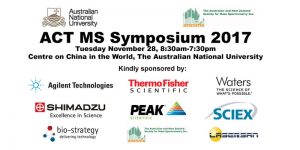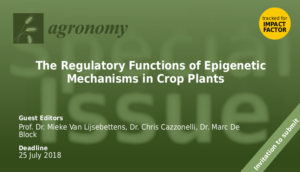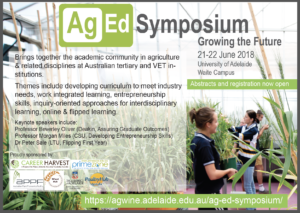- About
- Members
- Join
- Member log in
- Membership Renewal
- Member directory
- Life Members
- ASPS Life Member Professor Graham Farquhar
- ASPS Life Member Associate Professor Hendrik (Hank) Greenway
- ASPS Life Member Dr Marshall (Hal) D Hatch
- ASPS Life Member Dr Paul E Kriedmann
- ASPS Life Member Dr Mervyn Ludlow
- ASPS Life Member Emeritus Professor Rana Munns
- ASPS Life Member Conjoint Professor Christina E Offler
- ASPS Life Member Professor (Charles) Barry Osmond
- ASPS Life Member Emeritus Professor John W Patrick
- ASPS Life Member Dr Joe Wiskich
- Corresponding Members
- Elected Fellows
- Events
- Awards & Funding
- Employment
- Publications
- Research
- Teaching
- Menu
Invitation to submit to a special issue “The Regulatory Functions of Epigenetic Mechanisms in Plants”
22 May 2018
Special Issue “The Regulatory Functions of Epigenetic Mechanisms in Plants”
Guest Editor: Dr. Chris Cazzonelli
Senior Lecturer in Plant Molecular Biology, Environmental Epigenetics Laboratory, Hawkesbury Institute for the Environment, Building L9.G30, Bourke St, Richmond, Australia
ASPS 2018 Peter Goldacre and inaugural Jan Anderson Award winners
20 May 2018
Dear All,
It is our pleasure to announce two major ASPS awards – the 2018 Peter Goldacre Award and the inaugural Jan Anderson Award.
These are the premier research awards from ASPS in a calendar year. The Peter Goldacre award is awarded for research contributions for ECRs within 10 years of their active research career, and the Jan Anderson Award is a new award specifically for MCR female researchers. Both award have been named after researchers and are supported by donations. More details can be found on the ASPS website.
It is our pleasure to announce the following awardees.
Dr Caitlin Byrt (University of Adelaide) – Goldacre Awardee 2018
Dr Eloise Foo (University of Tasmania) – Jan Anderson Awardee 2018
Both Caitlin and Eloise have been invited to receive their awards, and give their award lecture, at COMBIO 2018 to be held in Sydney this September. Many congratulations to both of you on your significant research achievements on behalf of ASPS.
Please register for COMBIO if you haven’t already to support Australian plant sciences and discuss your research with your peers.
It was extremely difficult to pick a single winner for both awards this year, due to the extremely high quality of nominees. This bodes well for the future of Plant Sciences in this country, but it also means that some very talented researchers have missed out on the awards. ASPS would like to congratulate all nominees for the quality of their applications and their contributions to plant science research. This is one reason we felt there should be an additional award starting this year, as many of our talented researchers are deserving of extra recognition. We are also looking to role out discipline specific awards from 2019.
Best Regards,
Honorary Secretary, Aust Soc Plant Scientists
April GPC E-Bulletin and employment opportunities.
20 May 2018
We have several employment opportunities posted on the ASPS job board here.
|
|||||||||||||||||||||||||||||||||||||||
|
|||||||||||||||||||||||||||||||||||||||
|
|||||||||||||||||||||||||||||||||||||||
|
Registrations now open for AgEd Symposium, Adelaide June 21-22 2018.
10 April 2018
AgEd Symposium brings together the academic community in agriculture and related disciplines at Australian tertiary and VET institutions.
Themes include developing curriculum to meet industry needs, work integrated learning, entrepreneurship skills, inquiry-oriented approaches for interdisciplinary learning, online & flipped learning.
Keynote speakers include:
Professor Beverley Oliver (Deakin, Assuring Graduate Outcomes)
Professor Morgan Miles (CSU, Developing Entrepreneurship Skills)
Dr Peter Sale (LTU, Flipping First Year)
To register and submit abstracts please visit:
https://agwine.adelaide.edu.au/ag-ed-symposium/registration/
The ‘sweet spot’ in plant-microbe symbiotic relationships
03 April 2018
BY JONATHON PLETT
2017 GOLDACRE MEDAL WINNER
Growing up in the countryside of Ontario, Canada, Jonathan Plett was exposed to plants and planted environments from a very early age. While a love for agriculture and ‘useful’ plants would come to fruition in his research career, Jonathan’s first induction into the world of plants was through flower gardening – a hobby introduced to him at the age of 10 by an English couple active within the local gardening club. Over the years of working with plants, Jonathan became fascinated by the mechanics of how plants grew and flourished and how different environmental conditions affected these processes.
 As early as the age of 12 Jonathan knew that he wanted to have a job working with plants in some form – his first science fair project was testing hydroponic systems for optimal plant growth. Through his undergraduate work in college, this interest was further strengthened and led to a PhD in plant molecular biology. This area of science has continued to fuel his imagination and to fascinate him to this day. Jonathan did his PhD studies with Dr. Sharon Regan at Queen’s University in Canada where he studied the biological function of the plant hormone ethylene. One aspect of this hormone was its huge role in plant:microbe interactions. This led to a career shift in his post doctoral work and to his current position as a Lecturer in the Hawkesbury Institute for the Environment at Western Sydney University where he considers the molecular mechanics of how plants interact with soil-borne microbes.
As early as the age of 12 Jonathan knew that he wanted to have a job working with plants in some form – his first science fair project was testing hydroponic systems for optimal plant growth. Through his undergraduate work in college, this interest was further strengthened and led to a PhD in plant molecular biology. This area of science has continued to fuel his imagination and to fascinate him to this day. Jonathan did his PhD studies with Dr. Sharon Regan at Queen’s University in Canada where he studied the biological function of the plant hormone ethylene. One aspect of this hormone was its huge role in plant:microbe interactions. This led to a career shift in his post doctoral work and to his current position as a Lecturer in the Hawkesbury Institute for the Environment at Western Sydney University where he considers the molecular mechanics of how plants interact with soil-borne microbes.
The goal of Jonathan’s research is to foster the relationship between symbiotic soil-borne micro-organisms and plants. These organisms increase plant productivity through improved nutrient availability and plant disease resistance. As intensified agricultural and forestry production is resulting in soils with reduced nutritional value and as plant diseases are becoming more virulent, growers and foresters are becoming more reliant on these symbiotic relationships to support the health and productivity of their plants. Therefore, we need to select plants that will be able to gain the most from relationships with symbiotic micro-organisms. Currently we only have a rudimentary idea of the plant genetics that enable these symbiotic relationships to occur, let alone how we could select plants that foster these symbiotic relationships. Jonathan’s research is addressing this critical lack of knowledge by studying the plant pathways targeted by symbiotic ‘effector’ proteins during the initial stages of the interaction between plants and micro-organisms. Jonathan’s research has shown that these effectors, which are small-secreted microbial proteins, are used by mycorrhizal fungi to manipulate the plant immune response, thereby fostering symbiosis. This means that the tactics used by mycorrhizal fungi to gain access to their host tissues mirror those of pathogenic organisms, with the production of proteins used to overcome host defences (Plett et al., 2014a). Thus, in response, the plant has evolved mechanisms to defend itself from excessive ingrowth of mycorrhizal hyphae, while still enjoying the beneficial aspects of the relationship.
Jonathan’s work has shown that the plant uses two classic plant hormone pathways: jasmonic acid (JA) and ethylene, to limit fungal growth within plant tissues (Plett et al., 2014b). His work in the metabolic regulation during mycorrhizal colonization of plants has also shown that plants produce toxic secondary compounds to slow fungal growth and that only certain mycorrhizal fungi are able to overcome these defences by either metabolising the defence compound (Tschaplinski et al., 2014) or by inducing the expression of proteases and xenobiotic efflux pumps to weather the onslaught raised by the plant (Plett et al., 2015). Altogether, the results of Jonathan’s work have led to a paradigm shift in how we understand the core relationship between plants and their associated mycorrhizal fungi. His data are now being used to screen new tree and, more recently, crop lines (Plett et al., 2016), to find the ‘sweet spot’ in immune defence that enables plants to maximise the benefits from mycorrhizal fungi without compromising disease resistance. The application of these findings will result in more productive tree plantations and better food security in crops.
Contact Information:
Email: j.plett@westernsydney.edu.au
Twitter: @FungiDownUnder
Website: https://www.westernsydney.edu.au/hie/people/researchers/doctor_jonathan_plett
Google Scholar: https://scholar.google.com/citations?user=Pg1MvmEAAAAJ&hl=en
Key References:
Plett JM, Daguerre Y, Wittulsky S, Deveau A, Melton SJ, Kohler A, Morrell-Falvey J, Brun A, Veneault-Fourrey C, Martin F. (2014a) The effector protein MiSSP7 of the mutualistic ectomycorrhizal fungus Laccaria bicolorinteracts with PopulusJAZ proteins. Proceedings of the National Academy of Science USA. 111:8299-8304.
Plett JM, Khachane A, Ouassou M, Sundberg B, Kohler A, Martin F. (2014b) Ethylene and jasmonic acid act as negative modulators during mutualistic symbiosis between Laccaria bicolor and Populus roots. New Phytologist 202:270-286.
Plett JM, Tisserant E, Brun A, Morin E, Grigoriev IV, Kuo A, Martin F, Kohler A. (2015) The mutualist Laccaria bicolor expresses a core gene regulon during the colonization of diverse host plants and a variable regulon to counteract host-specific defenses. Molecular Plant-Microbe Interactions28:261-73.
Plett JM, Plett KL, Bithell SL, Mitchell C, Moore K, Powell JR, Anderson IC. (2016) Improved Phytophthoraresistance in commercial chickpea (Cicer arietinum) varieties negatively impacts symbiotic gene signaling and symbiotic potential in some varieties. Plant, Cell & Environment.39:1858–186.
Tschaplinski TJ, Plett JM, Engle NL, Deveau A, Cushman KC, Martin MZ, Doktycz MJ, Tuskan GA, Brun A, Kohler A, Martin F. (2014) Populus trichocarpa and Populus deltoidesexhibit different metabolomic responses to colonization by the symbiotic fungus Laccaria bicolor. Molecular Plant-Microbe Interactions27:546-556.
Global Plant Council Feb E-bulletin and employment opportunities
07 March 2018
Hello ASPS members,
We have several new employment opportunities available here.
|
|||||||||||||||||||||||||||||||||||||||
|
|||||||||||||||||||||||||||||||||||||||
|
|||||||||||||||||||||||||||||||||||||||
|
Congratulations to ASPS member Graham Farquhar 2018 senior Australian
01 March 2018
Graham Farquhar – Senior Australian 2018
Graham started 2018 with yet another award on Australia Day – Senior Australian for 2018. For those of you unfamiliar with Graham, he has previously won the Prime Minister’s prize for Science in 2015, the Macfarlane Burnett medal from the AAS in 2016 and the Kyoto prize in 2017, to name the most recent. These awards are in recognition of his work that has led to wheat varieties with improved water use efficiency and improved representation of climate change trends associated with evaporation. Plants and water feature in both.
Australia has a significant grain growing industry reliant on rainfall rather than irrigation. Annual rainfall is low and variable between years and plays a major role in setting the potential yield that farmers can achieve. Together with colleagues, Graham developed two theoretical frameworks: firstly, a mathematical model describing photosynthesis based around the biochemical properties of the enzyme Rubisco (Farquhar, von Caemmerer & Berry, 1980) and secondly, equations describing what determines the stable isotopic composition of plants (Farquhar, O’Leary & Berry, 1982). There are two stable isotopic forms for carbon, 12C and 13C, with about 1% of the CO2 in the atmosphere containing 13C. Graham realised that carbon isotope discrimination could provide a way of capturing information about how much water a plant chose to spend in order to gain carbon. It turns out that the 13C/12C ratio in plant material is linearly related to the ratio of carbon gained in photosynthesis to water lost during transpiration. The measurement of the 13C/12C ratio of plant material allowed the identification of contrasting wheat lines and a trait that could be selected. Collaboration with the CSIRO plant breeder Richard Richards led to the release of commercial cultivars with greater yield under water limiting conditions for which they shared the Rank Prize in 2014. The carbon isotope theory has proved useful in a number of ways, in agriculture, ecophysiology and global flux models.
With regard to climate change, Graham’s interest in crop water use extended to larger environmental scales and he realised that some model predictions arising from climate change were misleading. Rather than atmospheric warming leading to an increase in potential evaporation, observations from instruments used by the Bureau of Meteorology and by farmers to schedule irrigation suggested the opposite trend (Roderick and Farquhar 2002).
Graham conducts his research at the Australian National University. He has been a strong supporter of Functional Plant Biology, publishing much of his stable isotope work there and encouraging others to do so.
Farquhar GD, von Caemmerer S, Berry JA. 1980. A biochemical model of photosynthetic CO2 assimilation in leaves of C3 species. Planta 149: 78-90.
Farquhar GD, O’Leary MH, Berry JA. 1982. On the relationship between carbon isotope discrimination and the intercellular carbon dioxide concentration in leaves. Australian Journal of Plant Physiology 9: 121-137.
Roderick ML, Farquhar GD. 2002. The cause of decreased pan evaporation over the past 50 years. Science 298: 1410-1411.
GPC January
08 February 2018
|
President’s letter announcing the Jan Anderson Award and Lecture
03 December 2017
Dear ASPS members,
It seems like only yesterday I wrote to you in my new role of the Society’s President, and now it is time to wrap 2017 and reflect on events and achievements. Indeed, time flies.
For me the last 12 months have been extremely busy and rather hectic and I can bet that most of you will probably say the same. What worries me the most is that, in a constant chase of deadlines, we often do not have to time to enjoy what we are doing. The joy of getting some exciting result or having a grant funded or a paper accepted is usually short-lived and is soon replaced by a pressing need to meet yet another deadline. Do you have the same feeling?
To change this worrisome pattern I have decided to break the tradition of spending Sunday morning editing student’s papers (isn’t this our usual routine these days?) and spend a few minutes reflecting on what the Society has achieved in 2017.
The Combio meeting in Adelaide was a great success. Many thanks to all ASPS members involved in making it happening and, specifically, to Matt Gilliham and Rachel Burton who took a major workload in organizing this event. We are also looking forward towards equally successful Sydney meeting in 2018.
Many thanks to all of you who have managed to find a time in a busy schedule and attend AGM meeting at Combio. Those who can’t make it or did not attend the conference for one or another reason, can find a brief snapshot of major events and achievements in my report on ASPS website. Right now I want to briefly inform you on some progress made after the meeting, to implement new initiatives approved by the Society.
One of the central topics during the ASPS executive meeting in Adelaide was an issue of a gender equality in plant science. In order to bridge the existing gap, we have decided to introduce a new award that will be given to an early or mid-career female researcher in recognition of outstanding research conducted subsequent to her PhD. This award is named after Jan Anderson – a pre-eminent scientist and a foundation member of this Society. Now I am very pleased to inform you that this award has been formally launched, and the application for the inaugural 2018 Anderson Award is opened from Dec 1, with submission deadline being Feb 28, 2018. For more details and submission guidelines please visit ASPS website. I would also like to express my sincere gratitude to three of the sponsors of this award: CSIRO Agriculture and Food, the ARC Centre of Excellence in Plant Energy Biology, and the ARC Centre of Excellence for Translational Photosynthesis. We are looking for your nominations and thrilled to celebrate excellence in research by our leading Society female members.
Talking about awards, the decision has been also made to introduce several discipline-specific awards given to ECR on a bi-annual basis. We are working on this right now and hope to finalize the rules in early 2018. I will keep you posted on progress.
I thank you all for your contribution to the Society and also for the front line work as a researcher you are doing to promote the image of Australian plant science. I wish you all the best for the new 2018 and hope you can soon get a well-deserved rest and enjoy a break.
Sergey Shabala
ACT Mass Spectrometry Symposium 2017
07 November 2017
THE FULL PROGRAM AND FREE REGISTRATION ARE NOW OPEN for:
ACT Mass Spectrometry Symposium 2017, Tuesday November 28, 2017.
Get in QUICKLY because seats a strictly limited!
Description
 The ACT Mass Spectrometry Symposium is intended as an interactive forum for experts and novices to discuss the application of mass spectrometry to solving problems and to allow the dissemination of current and future trends in the technology. The speakers represent academic and commercial backgrounds and will cover a wide range of applications as can be seen in the programme below.
The ACT Mass Spectrometry Symposium is intended as an interactive forum for experts and novices to discuss the application of mass spectrometry to solving problems and to allow the dissemination of current and future trends in the technology. The speakers represent academic and commercial backgrounds and will cover a wide range of applications as can be seen in the programme below.
Programme
8:55 am WELCOME
9:05 am Clayton Ross (Shimadzu):
Shimadzu GCMS TQ-8050 – Speed Without Compromise (Simultaneous MRM, SIM and SCAN)
9:30 am David DeSouza (Metabolomics Australia, VIC):
Comprehensive Metabolite Profiling by GC-QQQ: A Change in Approach
9:55 am Chris Fouracre (Agilent Technologies):
Revealing the New Ultivo Triple Quadrupole LC/MS
10:20 am David Beale (CSIRO Land & Water, QLD):
Expanding Characterization of Environmental Pollution and Ecosystem Health Using Metabolomic Approaches
10:45 am MORNING TEA BREAK
11:15 am Steve Binos (Thermo Fisher):
Orbitrap DIA; Beyond ID’s for your Proteomic Needs.
11:40 am Rikard Hedman (ANU Research School of Chemistry, ACT):
Detection of Sulfate Conjugated Compounds by Untargeted Mass Spectrometry
12:05 pm Nicole Pendini (Peak Scientific):
Gas Generators: the Safe Onsite Alternative to Cylinders and Dewars
12:30 pm LUNCH BREAK
1:30 pm Chris Hodgkins (AB Sciex):
SelexION®+; Improving Triple-Quadrupole Selectivity with Differential Mobility Spectrometry (DMS) to Reach Lower Limits of Quantitation.
1:55 pm Steve Van Sluyter (Macquarie University, NSW):
Absolute Quantification of Leaf Proteins on a Continental Scale Using SWATH
2:20 pm Heather Patsiouras (Waters):
Ion Mobility MS: Extending the Capability and Selectivity of MS
2:45 pm AFTERNOON TEA BREAK
3:00 pm Udo Rupprecht (Lasersan):
On-line Automated Sample Preparation for GC/MS and LC/MS
3:25pm John Foster (ANU Research School of Earth Sciences, ACT):
Development of Shrimp Ion Microprobe
3:50 pm Alex Donald (University of NSW School of Chemistry, NSW):
Highly Charged Protein Ions: The Strongest Acids to Date
4:15 pm Awards and Announcements
4:30-7:30 pm POST-SYMPOSIUM DRINKS and NIBBLES
For More Information contact Adam Carroll
Recent Posts
Tags
Archives
- June 2025
- May 2025
- April 2025
- March 2025
- February 2025
- January 2025
- December 2024
- November 2024
- October 2024
- September 2024
- August 2024
- July 2024
- June 2024
- May 2024
- April 2024
- February 2024
- January 2024
- November 2023
- October 2023
- September 2023
- August 2023
- July 2023
- June 2023
- May 2023
- April 2023
- March 2023
- February 2023
- December 2022
- November 2022
- October 2022
- September 2022
- August 2022
- July 2022
- June 2022
- May 2022
- April 2022
- March 2022
- February 2022
- January 2022
- December 2021
- November 2021
- October 2021
- September 2021
- August 2021
- July 2021
- June 2021
- April 2021
- March 2021
- February 2021
- January 2021
- December 2020
- November 2020
- October 2020
- September 2020
- August 2020
- July 2020
- June 2020
- May 2020
- April 2020
- March 2020
- February 2020
- January 2020
- December 2019
- November 2019
- October 2019
- September 2019
- August 2019
- July 2019
- June 2019
- May 2019
- April 2019
- March 2019
- February 2019
- January 2019
- December 2018
- November 2018
- October 2018
- September 2018
- August 2018
- July 2018
- June 2018
- May 2018
- April 2018
- March 2018
- February 2018
- January 2018
- December 2017
- November 2017
- October 2017
- September 2017
- August 2017
- July 2017
- June 2017
- May 2017
- April 2017
- March 2017
- February 2017
- January 2017
- December 2016
- November 2016
- October 2016
- September 2016
- August 2016
- July 2016
- June 2016
- May 2016
- April 2016
- March 2016
- February 2016
- January 2016
- December 2015
- November 2015
- October 2015
- September 2015
- August 2015
- July 2015
- June 2015
- May 2015
- April 2015
- March 2015
- February 2015
- January 2015
- December 2014
- November 2014
- October 2014
- September 2014
- August 2014
- July 2014
- June 2014
Copyright 2017 Australian Society of Plant Scientists Disclaimer & Privacy
Website by Michael Major Media


